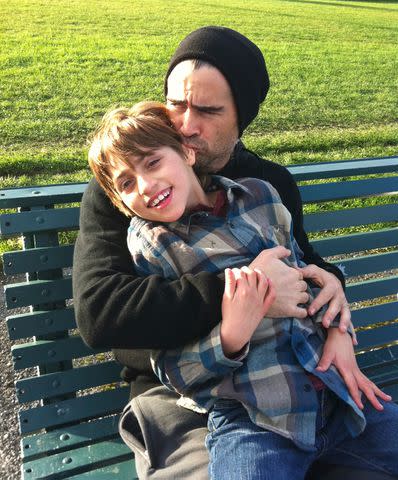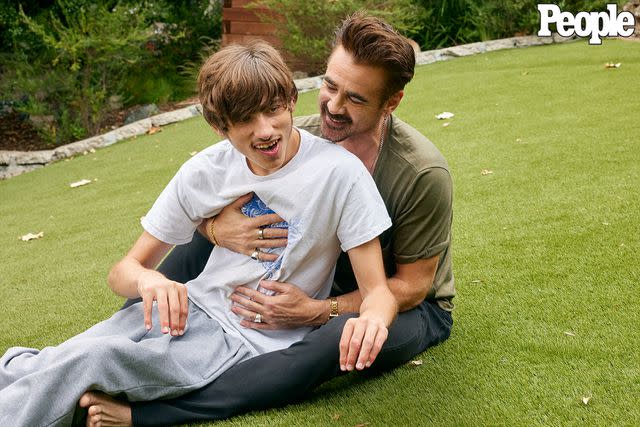What Is Angelman Syndrome? Everything to Know About the Rare Genetic Disorder Colin Farrell’s Son James Has
The rare neurogenetic disorder affects 1 in 15,000 people
For the first time, Colin Farrell has opened up his home and talked in-depth about life with his son James, who has Angelman syndrome.
James was just a toddler when he was diagnosed with the rare neurogenetic disorder. Now 20, his family still struggles with finding the support that he “deserves and should rightfully have,” Farrell, 48, tells PEOPLE in this week’s issue.
“I want the world to be kind to James. I want the world to treat him with kindness and respect,” the actor says, which has been the driving factor for raising awareness about Angelman syndrome.
“I'm very private,” Farrell tells PEOPLE, calling his home a safe space. “But I choose to believe that, if James knew that doing this could help families and could help other children and young adults who live with special needs, James would say, ‘Dad, what are you talking about? Why are you even asking me? It's a no-brainer.’”

Angelman syndrome, which affects 1 in 15,000 people, is a rare neurogenetic disorder that stems from a mutation or deletion of a gene in the 15th chromosome, called the ubiquitin protein ligase E3A (UBE3A) gene.
The condition can cause severe developmental delays and is typically first noticed when a baby is not crawling or babbling between 6 and 12 months, according to the Mayo Clinic. It can cause difficulties walking, talking and eating, as well as seizures, balance issues, excessive laughter, sleep troubles, scoliosis and obesity due to limited mobility.
Never miss a story — sign up for PEOPLE's free daily newsletter to stay up-to-date on the best of what PEOPLE has to offer, from celebrity news to compelling human interest stories.

Courtesy Colin Farrell
Colin Farrell with his son JamesAngelman syndrome shares symptoms and characteristics with other disorders like autism, cerebral palsy and Prader-Willi syndrome, which is why 50% of individuals are originally misdiagnosed, according to the Angelman Syndrome Foundation.
“Angelman syndrome is not easy to get diagnosed,” Paula Evans, CEO of the newly established Colin Farrell Foundation, tells PEOPLE. “It doesn't come up in any prenatal testing, and you have to actually know what you're looking for in order to test for it.”
Children who have the disorder are often not diagnosed until they are between 3 and 7 years old. It's confirmed through a genetic blood test. Once officially diagnosed, early intervention is key.
Although there is no cure for Angelman syndrome, treatment for the condition involves managing symptoms and addressing any developmental delays. This can include anti-seizure medications, physical and occupational therapy, speech therapy, behavioral therapy, sleep training or sleep management medications, and more.

For Farrell, doing research and finding a community helped him learn how to best care for his son. James started walking at age 4 and hasn’t had a seizure in a decade. He also feeds himself and is able to communicate and show affection, despite being nonverbal.
“With Angelman syndrome, not every child presents the same,” he says. “It's a broad spectrum of characteristics that come with the condition, but you can start zoning in on your child so that you can treat your child as an individual under the umbrella of wealth of information that's being gathered pertaining to the condition that they may have.”
“Rare disease by its nature means that in your own community, you're probably not going to find somebody that has any shared experience in what you're dealing with,” Evans also notes. “So that sense of community and being able to bond and network and share tips and strategies, it's critical.”
For more of Farrell's exclusive interview, pick up this week's issue of PEOPLE on newsstands Friday.

The life expectancy of people with Angelman syndrome is normal, but individuals with the condition will require life-long care. However, Farrell explains that with James turning 21 in September, he will age out of many of the support systems provided for families with kids who have special needs.
“Once your child turns 21, they’re kind of on their own,” he says. “All the safeguards that are put in place, special ed classes, that all goes away, so you’re left with a young adult who should be an integrated part of our modern society and more often than not is left behind.”
That is, in part, why Farrell is launching the Colin Farrell Foundation to provide support for adult children who have intellectual disabilities through advocacy, education and innovative programs.
The actor has "for years wanted to do something in the realm of providing greater opportunities for families who have a child with special needs, to receive the support that they deserve, basically the assistance in all areas of life," he says.
James, and those like him, have "earned the right to have a greater degree of individuality and autonomy in life, and a greater degree of community."
For more information or learn how you can offer support, visit www.colinfarrellfoundation.org.
For more People news, make sure to sign up for our newsletter!
Read the original article on People.

